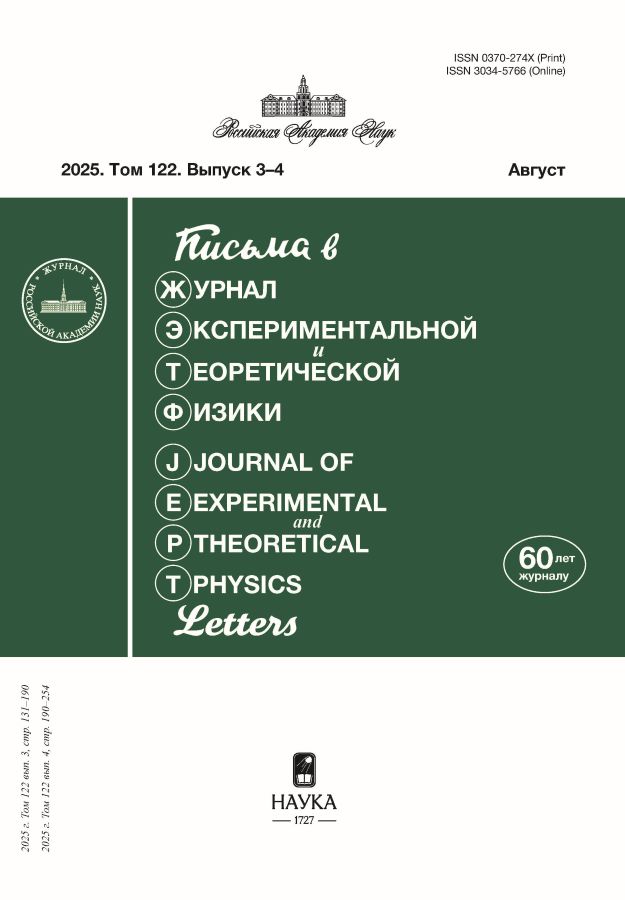Vol 120, No 3-4 (2024)
Articles
Jet quenching for hadron-tagged jets in pA collisions
Abstract
We calculate the medium modification factor IpA for 5.02 TeV p+Pb collisions. We use the Monte-Carlo Glauber model to determine the parameters of the quark-gluon plasma fireball in pA jet events. Our calculations show that the jet quenching effect for IpA turns out to be rather small. We have found that the theoretical IpA as a function of the underlying event charged multiplicity density, within errors, agrees with data from ALICE [18] for 5.02TeV p+Pb collisions. However, the experimental errors are too large to draw a firm conclusion on the possible presence of jet quenching.
 169-170
169-170


Troyki svyazannykh prostranstvennykh solitonov v tonkoy levoorientirovannoy plenke na pravoorientirovannoy podlozhke s effektom Kerra
Abstract
 171-177
171-177


Pokryvayushchaya sposobnost' nanochastits sul'fida serebra v sul'fidnykh kompozitakh
Abstract
 178-183
178-183


Zaderzhka elektronov pri fotoionizatsii 2s- i 2p-obolochek Ne s uchetom rasseyaniya fotoelektronov
Abstract
 184-189
184-189


Obratnyy effekt Faradeya v plenkakh ferritov-granatov v blizhnem IK-diapazone
Abstract
 190-196
190-196


Lokal'nye poverkhnostnye plazmonnye rezonansy v plenochnykh strukturakh Cu/As2Se3
Abstract
 197-202
197-202


Fononnye spektry i reshetochnaya teploprovodnost' vysokoeffektivnogo termoelektrika SnSe
Abstract
 203-207
203-207


Nelineynyy koeffitsient Kholla v plenkakh trekhmernogo topologicheskogo izolyatora
Abstract
 208-213
208-213


Verkhnyaya granitsa temperatury sverkhprovodyashchego perekhoda v teorii Eliashberga–MakMillana
Abstract
 214-216
214-216


On exchange-correlation energy in DFT scenarios
Abstract
Motivated by the considerable importance of material properties in modern condensed matter physics research, and using techniques of the Ne-electron systems in terms of the electron density nσe (r) needed to obtain the ground-state energy Ee0 in Density Functional theory scenarios, we approach the exchange-correlation energy Exc [nσe(r)] by considering the interelectronic position corrections Δr↑↑,↑↓ x = |δr↑↑ − δr↑↓| and Δr eiej6≠i c = λc |r − r′|−(Ne−1)−1 corresponding to the spin and the Coulomb correlation effects, respectively, through the electron-electron potential energy. Exploiting such corrections, we get approximate expressions for the exchange Ex [nσe] and the correlation Ec [nσe] functional energies which could be interpreted in terms of magnetic and electric dipole potential energies associated with the charge density nσe (r) described by inversesquare potential behaviors. Based on these arguments, we expect that such obtained exchange-correlation functional energy could be considered in the Local Density Approximation functional as an extension to frame such interelectronic effects.
 217-218
217-218


O vozmozhnosti umnozheniya chastoty kolebaniy v gigavattnom ul'trakorotkom SVCh-impul'se
Abstract
 219-227
219-227


Blizhnepolevye effekty v uzlakh zolotoy nanoseti, vyrashchennoy lazernoy ablyatsiey v sverkhtekuchem gelii: krossover mezhdu “goryachimi tochkami” tipa “ostrie” i “zazor”
Abstract
 231-237
231-237


Korrelyatsionnaya teoriya fluktuatsiy fluorestsentsii odinochnykh molekul, sluchayno dvizhushchikhsya v nanokolodtse
Abstract
 238-244
238-244


Modified Bridgman formula for the thermal conductivity of complex (dusty) plasma fluids
Abstract
A simple and popular Bridgman’s formula predicts a linear correlation between the thermal conductivity coefficient and the sound velocity of dense liquids. Unfortunately, it cannot be applied to strongly coupled plasma-related fluids, because the sound velocity can greatly increase as screening weakens. We propose a modification of the Bridgman formula by correlating the thermal conductivity coefficient with the transverse (shear) sound velocity. This approach is demonstrated to work reasonably well in screened Coulomb (Yukawa) fluids and can be useful in the context of complex (dusty) plasmas.
 245-246
245-246


 247-251
247-251


Magnitnye svoystva nanosvitkov sostava (Mg1−xCox)3Si2O5(OH)4 i nanokompozitov na ikh osnove
Abstract
 252-259
252-259


Mekhanizm samoorganizatsii domennoy struktury v magnitnykh plenkakh v modeli Ginzburga–Landau
Abstract
 260-266
260-266


Ob opredelenii tverdotel'nykh klasterov v kristallizuyushcheysya sisteme Yukavy
Abstract
 267-272
267-272


Modelirovanie protsessa formirovaniya nanoprovodov Ir na poverkhnosti Ge(001)
Abstract
 273-278
273-278


Vozbuzhdennye sostoyaniya eksitonov v monosloyakh MoSe2 i WSe2
Abstract
 279-285
279-285


Synthesis and properties of 12442-family superconductor
Abstract
We report a synthesis of two members of recently discovered high-temperature superconductors of 12442 family, with formula MCa2Fe4As4F2 (M=Rb,K) and transition temperatures of 32.7 and 34.6K, respectively. Quality of the samples was assessed using X-ray powder diffraction, superconducting transitions were identified through transport and magnetic experiments. The temperature dependence of the upper critical field and vortex activation energy was investigated under magnetic fields up to 19T. Two distinct thermally activated flux flow regimes were observed in both systems. Field dependences of activation energy U0(H) indicate a change in the properties of vortex matter in these regimes and distinctly different dissipation mechanisms, reminiscent of cuprate HTSC.
 286-287
286-287


Korrelyatsionnye funktsii passivnogo skalyara kak mera statistiki gradienta skorosti
Abstract
 288-295
288-295


Slabyy khaos v foton-kubitnoy sisteme s anizotropnym vzaimodeystviem
Abstract
 296-303
296-303


Vliyanie metodov travleniya na dielektricheskie poteri kubitov-transmonov
Abstract
 304-311
304-311













